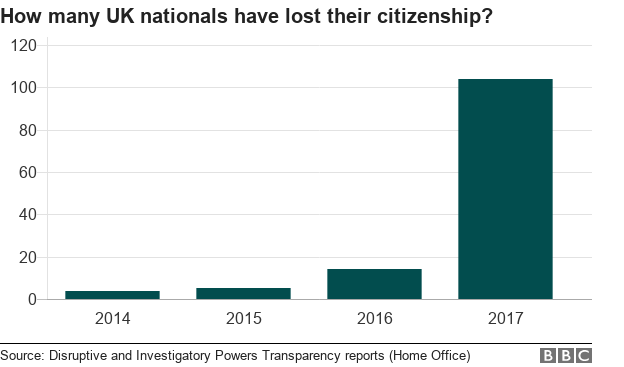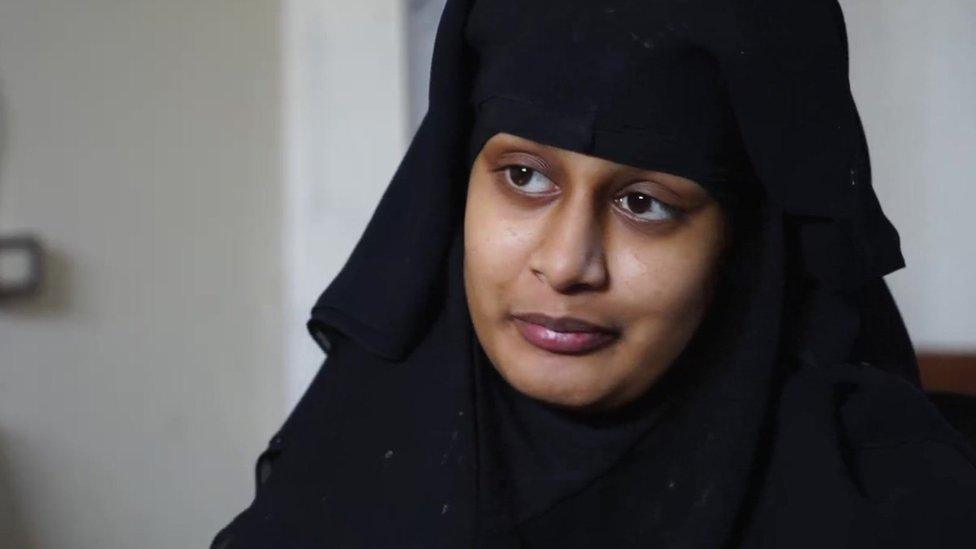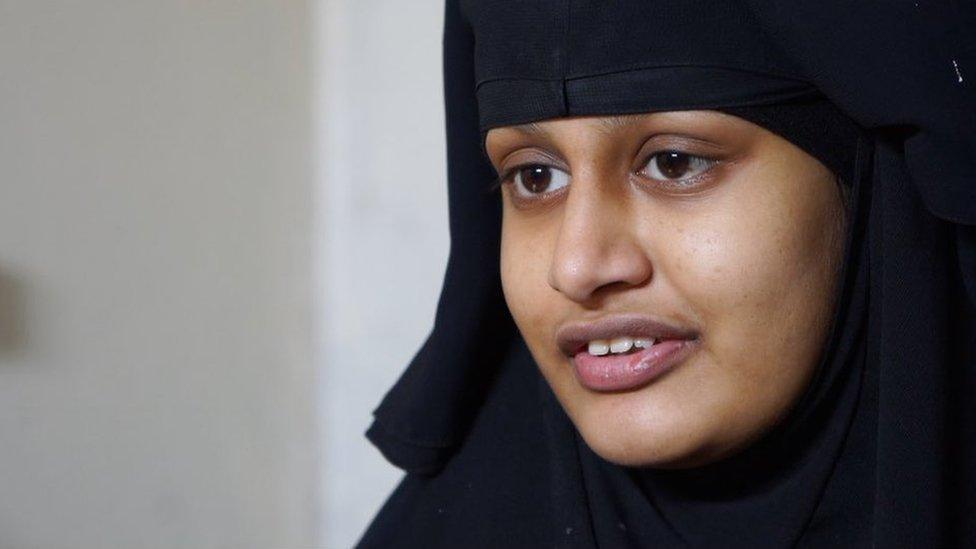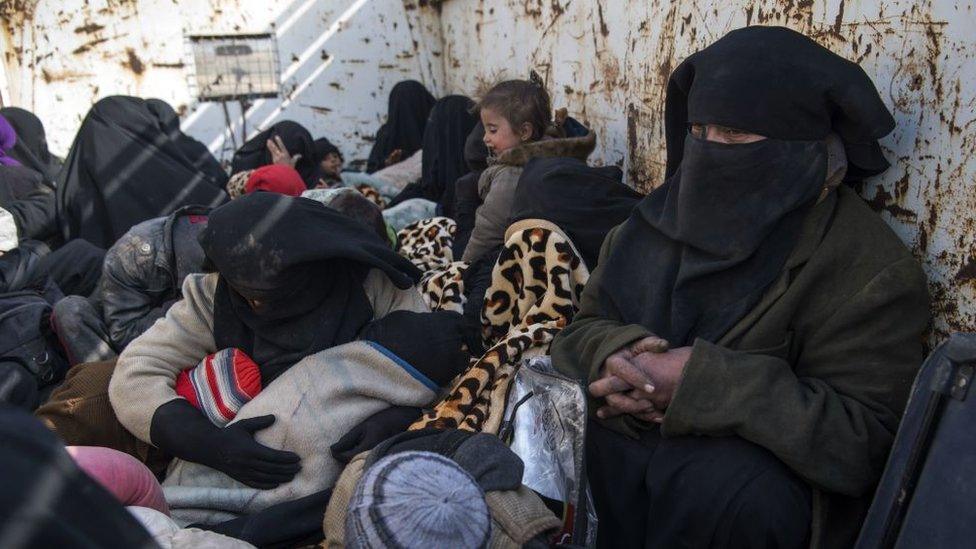Shamima Begum: What is her legal status?
- Published

Ms Begum was 15 and living in Bethnal Green, London, when she left the UK in 2015
Shamima Begum - the schoolgirl who fled London to join the Islamic State group in Syria - has been stripped of her UK citizenship after expressing a desire to return.
It is only possible to strip someone of their UK nationality if they are eligible for citizenship elsewhere - and it is thought Ms Begum could be a Bangladeshi citizen because she was born to a mother believed to be Bangladeshi.
However, Bangladesh's ministry of foreign affairs has said Ms Begum is not a Bangladeshi citizen and there is "no question" of her being allowed into the country.
Is she entitled to Bangladeshi citizenship?
Expert lawyers with experience in Bangladeshi citizenship cases have told the BBC that under Bangladesh law, a UK national like Ms Begum, if born to a Bangladeshi parent, is automatically a Bangladeshi citizen. That means that such a person would have dual nationality.
If the person remains in the UK, their Bangladeshi citizenship remains in existence but dormant.
Under this "blood line" law, Bangladeshi nationality and citizenship lapse when a person reaches the age of 21, unless they make efforts to activate and retain it.
So, it is Ms Begum's age, 19, that is likely - in part - to have given Home Office lawyers and the home secretary reassurance there was a legal basis for stripping her of her UK citizenship.
In 2018, the government lost an appeal case brought by two British citizens of Bangladeshi origin who were stripped of their citizenship when they were abroad.
The Special Immigration Appeals Commission ruled that E3 and N3 had not tried to retain their citizenship before they reached the age of 21, and so it had automatically lapsed.
Shamima Begum: "I got tricked and I was hoping someone would have sympathy with me"
That meant that the decision to strip them of their UK citizenship had rendered them stateless.
Ms Begum's case is different. Her Bangladeshi citizenship, if established, would remain intact until she reaches 21, even if she has never visited the country or made active efforts to retain her citizenship.
What are the rights of her child?
Home Secretary Sajid Javid has suggested that the decision to remove Ms Begum's UK citizenship will have no impact on her baby son's nationality.
While refusing to comment on individual cases, he told the Commons: "Children should not suffer. So, if a parent does lose their British citizenship, it does not affect the rights of their child."
Lord Carlile, former independent reviewer of terrorism legislation, said the baby may also be entitled to Bangladeshi and Dutch nationality - Ms Begum's husband is a Dutch convert to Islam, who she married in Syria.
As a British citizen, Ms Begum's child would have a right to enter the UK. However the British government has no consular staff in Syria to help get him out of the country.
Even if that were possible, the question of whether he should be separated from his mother would open up a whole new moral conundrum.
And after losing two children to illness in Syria, Ms Begum seems desperate to keep her third.
Why is it illegal to be stateless?
Under international law, external, a stateless person is someone who is "not considered as a national by any state under the operation of its law".
The Universal Declaration of Human Rights, external states that everyone has the right to a nationality and "no-one shall be arbitrarily deprived of their nationality".
The home secretary has the power, external to strip an individual of their British citizenship on the basis that it is "conducive to the public good", as long as the person would not become stateless as a result.
The Home Office says that the exception to this is where the UK government believes the person is eligible to acquire the citizenship of another country - even if they do not currently have dual nationality.
The BBC asked people in London's Bethnal Green, where Shamima Begum went to school, whether she should be allowed back to the UK
Shadow home secretary Diane Abbott has accused Mr Javid of breaching the declaration by stripping Ms Begum of her UK citizenship.
However, Mr Javid has said the Home Office would never take that decision if someone only had one nationality.
Does this create a two-tier system?
Effectively, yes.
If both your parents were born in the UK and you do not have dual nationality, it would not be possible for the Home Office to strip you of your British citizenship, as this would leave you stateless.
But for a British child of a dual national or immigrant, who is eligible for another nationality, it would be.
Lord Anderson, a former independent reviewer of terrorism legislation, said it "effectively brings about two classes of citizenship".
Could Ms Begum have her UK citizenship reinstated?
She would need to bring a legal challenge against the home secretary's decision to strip her of her citizenship.
This would be heard at the Special Immigration Appeals Commission (Siac).
If her family disagreed with that panel's decision, they could appeal on a point of law to a higher court, and ultimately to the UK Supreme Court.
Since 2015, Siac has heard seven cases involving loss of citizenship, external, of which two were successful.
But it can take years before a case is brought to Siac - so there could be a lot of cases that are still waiting to be heard.
How many UK nationals have lost their citizenship?
Until very recently, the power to strip an individual of their citizenship was rarely used.
In 2016 it was used just 14 times, but this increased to 104 in 2017 - the latest year data is available.

- Published21 February 2019

- Published20 February 2019

- Published15 February 2019
